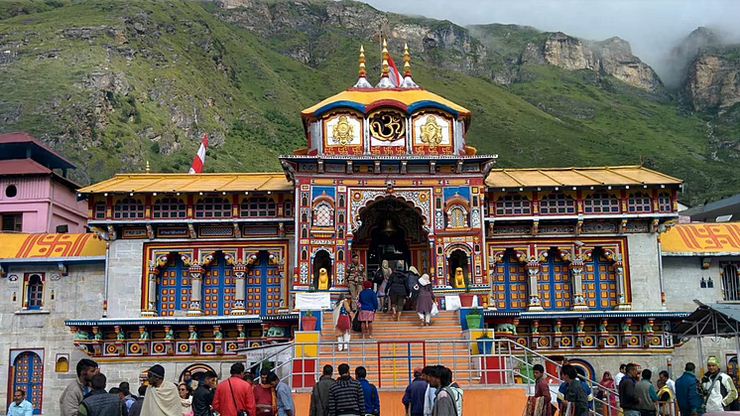This has been the season of BJP going back its decisions one after another. While the repealing of farm laws was a rather inexplicable move, the BJP Government in Uttarakhand has taken an inclusive decision by annulling the Char Dham Devasthanam Board Act, which had brought over 50 temples, including Char Dham shrines of Gangotri, Yamunotri, Badrinath, and Kedarnath, under the state’s control.
Taking to Twitter, state CM Pushkar Singh Dhami tweeted in Hindi, “Sometimes, if any contradiction or doubt arises between the intention of the government and the public sentiments, then it becomes the duty of the government to remove it at the earliest with the help of dialogue and sensitivity. Today’s decision is a reflection of this healthy democratic tradition.”
कभी–कभी यदि सरकार की मंशा और जन भावनाओं के बीच कोई विरोधाभास या संशय पैदा हो जाता है तो सरकार का फ़र्ज़ बनता है कि संवाद और संवेदनशीलता के सहारे उसे यथाशीघ्र दूर किया जाय। आज का यह निर्णय इसी स्वस्थ लोकतांत्रिक परंपरा का परिचायक है।@narendramodi @JPNadda @BJP4India @BJP4UK pic.twitter.com/oSwKakCETP
— Pushkar Singh Dhami (Modi Ka Parivar) (@pushkardhami) November 30, 2021
The decision was taken after a high-level committee appointed by the Dhami government to investigate the Uttarakhand Char Dham Devasthanam Management Act, 2019 gave its final report to Chief Minister Pushkar Singh Dhami on Sunday (November 2) in Rishikesh.
When was the contentious Act brought?
The Uttarakhand Char Dham Devasthanam Management Act, 2019, was passed by former CM Trivendra Singh Rawat in the state Assembly which ultimately became the Uttarakhand Char Dham Devasthanam Management Act, 2019.
In January 2020, the government at the time constituted the Uttarakhand Char Dham Devasthanam Board under the act. As reported by TFI, the provisions of the act stated that the Chief Minister was to be appointed as chairman while the minister for religious affairs was to be the vice-chairman of the board.
Important
The Uttarakhand government has scrapped the Chardham Devasthanam board. The Devsthanam priests had been demanding scrapping of the board ever since its creation, saying it was an infringement of their traditional rights over the temples.#HinduTemples
— Deeksha Negi (@NegiDeekshaa) November 30, 2021
Two MLAs of Gangotri and Yamunotri were designated to be the members on the board along with the Chief Secretary.
However, owing to the widespread protests from the priests and public with the former arguing that they were kept in dark about the new legislation, the now sacked CM Tirath Singh Rawat, after coming to power had also remarked that he will free the temples from the clutches of the government. However, the decision was not formalized.
Read More: In an unprecedented move, new Uttarakhand CM frees 51 temples from government control
Protests by prominent Hindu bodies
At the time, Hindu bodies such as Vishwa Hindu Parishad and Rashtriya Swayamseak Sangh (RSS) had made their discomfort with the Act known to the BJP government and were in the process of galvanizing a public sentiment against the state taking over Hindu temples.
The VHP had said that once the donation drive for the Ram Mandir was over, they will hold meetings with the temple priests and form a strategy to counter the government. VHP’s national joint secretary Surendra Jain had even alleged that donations received by the temple could be misused.
What is Chota Char Dham Yatra?
In Sanatan Dharma, ‘Char Dham Yatra’ is a sacred trip of the four most revered temples of India which includes Badrinath, Dwarka, Puri, and Rameswaram but the circuit of ‘Chota Char Dham Yatra’ is different from the main Char Dham Yatra and is situated only in Uttarakhand.
The Gangotri and Yamunotri Dham are the origin of the most revered, holy, and sacred rivers of India that is Ganga and Yamuna. The Kedarnath Dham is dedicated to Lord Shiva, which is also the part of 12 Jyotirlinga of Shiva, and last but not the least, the Badrinath Dham is dedicated to Lord Vishnu of Shiva.
Government should never interfere in the Temple’s business
The government has no business controlling Hindu temples, even while it does not control the places of worship belonging to other communities. Hindu temples have for long borne the brunt of various governments administrating them in a rather shameless manner, more often than not with the sole purpose to extort their coffers to fund the state and its various schemes. The money belonging to temples often gets split up among the administrators is something that does not need to be explicitly described.
The freeing of 51 Hindu temples should also serve as a reminder to Hindus across India to not shy away from demanding the rightful and immediate exit of governments from their spiritual and cultural centers.
Only when Hindu temples are freed from the government’s clutches will they be able to play a critical societal role of challenging the proselytization being spearheaded by Christian missionaries and Islamists.
Further, temples will be playing a tremendous role in keeping anti-Sanatan forces in check. Therefore, Hindus must strive for ensuring that their temples are freed from state control across the country.
